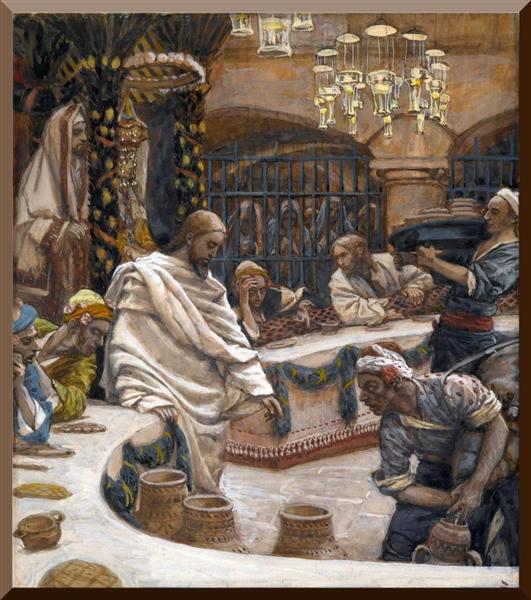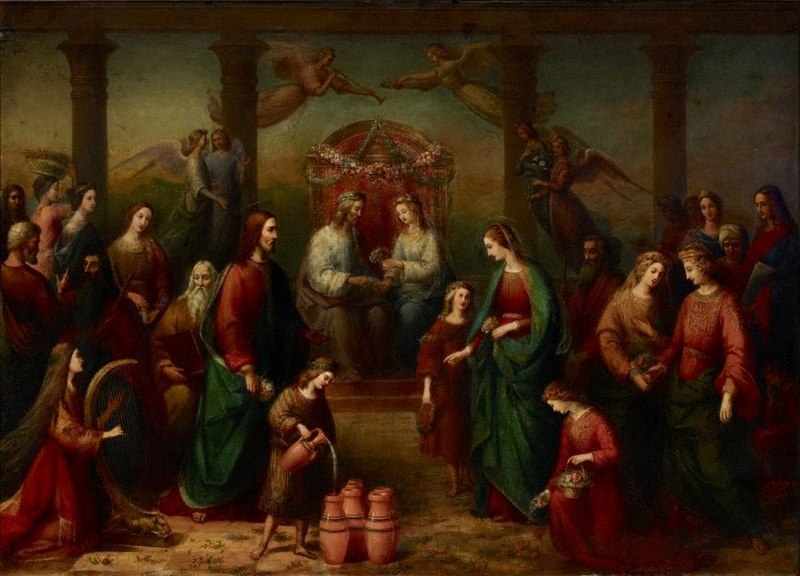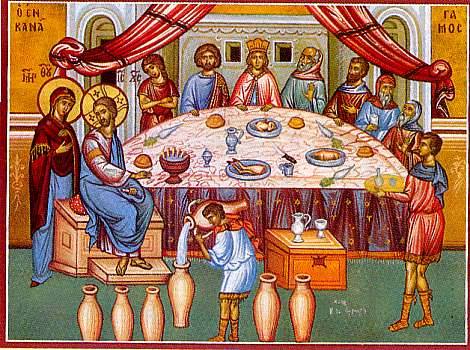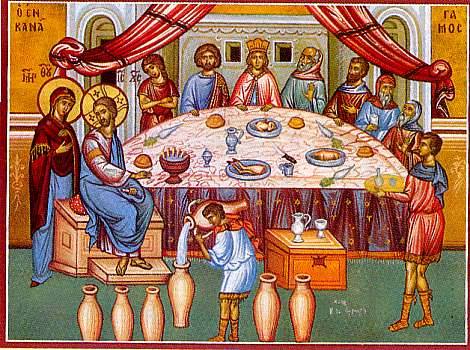John 2:1-11
Pastor James Preus
Trinity Lutheran Church
January 14, 2024
The overarching theme of Christmas, obviously, is the incarnation of Christ, that God became a man in human flesh. Epiphany means manifestation, that is, that Christ shows Himself to us. Our Gospel lesson concludes, “And He manifested His glory and His disciples believed in Him.” The purpose of Christ’s Epiphany is so that we will believe in Him. So, the overarching theme of the Epiphany season is faith.
What is faith? Faith is the marital union of the Church (the Bride) to her Bridegroom, Christ Jesus. Through faith the Church is united to her Husband. And through faith we are joined to Christ our Head. This is the meaning of Jesus turning water into wine at a wedding. Why is it this miracle that caused His disciples to believe in Him? Because this miracle manifested Christ’s love, kindness, generosity, and mercy.
Faith comes from hearing the Gospel, not the Law. The Law demands, but what it demands is never accomplished. The Law threatens, but its threats never succeed in producing the desired result. There were six stone water jars there for the Jewish rite of purification. Stone symbolizes the Law, which was inscribed in stone. Six represents incompleteness. Seven is complete. Seven is perfect. Six is incomplete and never reaches perfection. Through the Law, we never reach perfection. Through the Law’s commands, we are always missing what we need to be whole.
So, Christ cannot make us His bride through the Law. The Law only exposes our sins, our wrinkles, spots, and blemishes, that we are an unfit bride. The Law only tells us to become what we cannot make ourselves: a holy bride for a holy Bridegroom. So, Christ must come down to make us His bride. He must lavish His love upon us, so that we may believe in Him.
This is how St. Paul tells us that Christ made the Church His bride, when He instructed husbands on their conduct with their wives, “Husbands, love your wives, as Christ loved the church and gave Himself up for her, that He might sanctify her, having cleansed her by the washing of water with the word, so that He might present the church to Himself in splendor, without spot or wrinkle or any such thing, that she might be holy and without blemish.” And so, we learn that in Baptism, Christ makes you a member of His bride the Church. Baptism is Gospel. It is Christ’s work of cleansing you of your sin through water and the Word, and its benefits are received through faith alone.
Participating in the Lord’s Supper is participating in the Marital Union between Christ and His Church; it is a foretaste of the wedding banquet in heaven. The Sacrament of the Altar is an exclusive meal meant only for the Bride of Christ, that is, for the baptized, who are united to Christ through faith. Martin Luther wrote a preface to his Small Catechism (which is part of our Lutheran Confessions), where he instructs pastors on how to teach the Catechism. In it, he points out that the people had been abusing the freedom they had received in the Lutheran Reformation from the laws of the papacy by keeping themselves from the Lord’s Supper. Yet, instead of laying down a new law, Luther instructs pastors to encourage the people to receive the Sacrament willingly through faith by warning of the dangers against their souls and their great need to receive the Sacrament and by proclaiming the benefits of receiving the Lord’s Supper. Luther writes:
Last, since the tyranny of the pope has been abolished, people are no longer willing to go to the Sacrament, and thus they despise it. Here again encouragement is necessary, yet with this understanding: We are to force no one to believe or to receive the Sacrament. Nor should we set up any law, time, or place for it. Instead, preach in such a way that by their own will, without our law, they will urge themselves and, as it were, compel us pastors to administer the Sacrament. This is done by telling them, “When someone does not seek or desire the Sacrament at least four times a year, it is to be feared that he despises the Sacrament and is not a Christian, just as a person is not a Christian who does not believe or hear the Gospel.” For Christ did not say, “Leave this out, or, despise this,” but, “Do this, as often as you drink it” [1 Corinthians 11:25], and other such words. Truly, He wants it done, and not entirely neglected and despised. “Do this.” He says.
Now, whoever does not highly value the Sacrament shows that he has no sin, no flesh, no devil, no world, no death, no danger, no hell. In other words, he does not believe any such things, although he is in them up over his head and his ears and is doubly the devil’s own. On the other hand, he needs no grace, no life, no paradise, no heaven, no Christ, no God, nor anything good. For if he believed that he had so much evil around him, and needed so much that is good, he would not neglect the Sacrament, by which such evil is remedied and so much good is bestowed. Nor would it be necessary to force him to go to the Sacrament by any law. He would come running and racing of his own will, would force himself, and beg that you must give him the Sacrament.
Therefore, you must not make any law about this, as the pope does. Only set forth clearly the benefit and harm, the need and use, the danger and blessing, connected with this Sacrament. (Preface of Dr. Martin Luther: Enchiridion: The Small Catechism)
The Sacrament of the Altar can only be received worthily through faith. And so, it is only faith that can draw a person to worthily receive it. The Sacrament of the Altar is a blessing of the Marital Union between Christ and His Church, so it must be received willingly through faith. So, Martin Luther instructs pastors to convince people of three things. First, they are in great danger of the devil, the world, and their sinful flesh, which seek to drive them to death and hell. Apart from Christ, we are under the control of Satan, filthy in our own sins, wrinkled, spotted, and blemished, and doomed to death and hell.
Second, that in the Sacrament Christ offers deliverance from Satan, the world, and our sinful flesh. This Meal is not something we must do to make ourselves holy. Rather, in this Supper, we receive what Christ has prepared for us. Jesus turned water into wine quite remarkably, instantaneously. And so, he does in the Supper by turning wine into His blood and bread into His body. Yet, we must not forget the labor Christ did to prepare this Meal for us. As wine is produced through violence done to grapes, so the wine of this Supper was produced by violence done to our Lord Jesus, his blood being pressed out of His body and his body being baked on the cross like bread. The body given for you in the Supper was nailed to the cross for your sins. The blood shed for you in the Supper once poured out of Jesus’ wounds. By His stripes, we are healed. We like sheep went astray, but the Lord laid on Him our iniquities. No, this Meal is not at all about our works, neither is it a simple memorial meal. This meal is prepared for us at the great labor of our Lord, who laid down His life for His Bride. And so, we know participating in this Meal grants us deliverance of all the things Christ strove with on the cross: our sin, our flesh, our Satan.
Third, refusing this Meal is refusing Christ. If you had faith in Christ, you would urge yourself to be with Him. It is to be feared that if you continue to keep yourself from this Meal that you despise this Meal and do not have faith in the One who has prepared it. That is the most terrifying thing a Christian can hear.
These three points emphasize that the Lord’s Supper is Gospel. It is a means by which Christ comes to us in His grace and mercy. He comes to us as a beloved Bridegroom to His Bride. And the Bride, if she is the Bride, hastens to meet Him! This is the message Jesus conveys by turning water into wine at a wedding as His first miracle. He comes as a loving Bridegroom to bless us. Only His love can produce faith in our hearts. And only faith can unite us to Him.
Jesus loves marriage. His union with His Church is the apotheosis of marriage. Apotheosis means the most divine example. As Christ enjoys eternal companionship and chastity with His bride and their union produces many children of God, so God blesses marriage with lifelong companionship, chastity, and children. Yet our earthly marriages are not as perfect as Jesus’ union with His Church. As God told Eve when He cursed her and all women after her for her part in the fall into sin, women will resist submission to their husbands. And as God told Adam when He cursed him and all men after him for his part in man’s fall, men will toil under the sun to provide for themselves and their families. While children remain a blessing, they come at the cost of great pain for the woman and toil for the man.
Yet, why does a wife find it so difficult to submit to her husband as Scripture teaches? Is it not because she lacks faith that her husband will look out for her best interest? And why does a husband find it difficult to lay down his life for his bride as Scripture teaches? Is it not because he lacks faith that his sacrifice will be worth it? And why do couples now think that the blessing of children is not a blessing, but an expensive curse that should be limited, so that they can secure other earthly treasures? Is it not that they lack faith that God will provide for His children both now and in eternity? But Scripture does not teach that a wife submits to her husband, because she has faith in her husband. But rather, she submits to her husband, because she has faith in Christ. And a husband knows his sacrifice for his wife is worth it, because Christ’s sacrifice on the cross secures the reward of every cross he bears for Christ’s sake. And people drink wine at weddings to celebrate the future blessings they pray God will bestow on the couple, especially children, so Christians should pray for children in their marriages just as they pray that Christ’s Church would grow with more children of God.
Faith is the uniting of the Church to her Bridegroom, Christ. She is united to Him when she trusts in His goodness. And so, faith can be created in no other way than through the promises of God’s grace, to forgive, strengthen, and save, for Christ’s sake. May we hasten as a bride to meet Christ in His grace and mercy, so that our union to Him will grow ever stronger. Amen.




 RSS Feed
RSS Feed